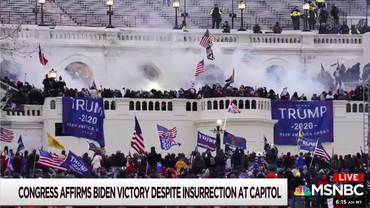Decision not decision
 It is the best of decisions, it is the worst of decisions.
It is the best of decisions, it is the worst of decisions.
For some, this week's decision by Facebook's Oversight Board in the matter of "the former guy" Donald J. Trump is a deliberate PR attempt at distraction. For many, it's a stalling tactic. For a few, it is a first, experimental stab at calling the company to account.
It can be all these things at once.
But first, some error correction. Nothing the Facebook Oversight Board does or doesn't do tells us anything much about governing the Internet. Although there are countries where zero-rating deals with telcos make Facebook effectively the only online access most people have, Facebook is not the Internet and it's not the web. Facebook is a commercial company's walled garden that is reached over the Internet and via both the web and apps that bypass the web entirely. Governing Facebook is about how we regulate and govern commercial companies that use the Internet to achieve global reach. Like Trump, Facebook has no exact peer, so it is difficult to generalize from decisions about either to reach wider principles of content moderation.
It's also important to recognize that Trump used/uses different social media sites in different ways. Facebook was important to Trump for organizing campaigns and advertising, as well as getting his various messages amplified and spread by supporters. But there's little doubt that personally he'd rather have Twitter back; its public nature and instant response made it his id-to-fingers direct connection to the media. Twitter fed him the world's attention. Those were the postings that had everyone waking up in the middle of the night panicked in case he had abruptly declared war on North Korea. After his ban, the service was full of tweets expressing relief at the silence.
The board's decision has several parts. First, it says the company was right to suspend Trump's account. However, it goes on to say, the company erred in applying an "indeterminate and standardless penalty of indefinite suspension". It goes on to tell Facebook to develop "clear, necessary, and proportionate policies that promote public safety and freedom of expression". The board's charter requires Facebook to make an initial response within 30 days, and the decision itself orders Facebook to review the case to "determine and justify a proportionate response that is consistent with the rules that are applied to other users of its platform". It appears that the board is at least trying not to let itself be used as a shield.
At the New York Times, Kara Swisher calls the non-decision kind of perfect. At the Washington Post, Margaret Sullivan calls the board a high-priced fig leaf. At Lawfare, Evelyn Douek believes the decision shows promise but deplores the board's reluctance to constrain Facebook, On Wednesday's episode of Ben Wittes's and Kate Klonick's In Lieu of Fun, panelists speculated what indicators would show the board was achieving legitimacy. Carole Cadwalladr, who broke the Cambridge Analytica story in 2016, calls Facebook, simply, cancer and views the oversight board as a "dangerous distraction".
When the board first began issuing decisions, Jeremy Lewin commented that the only way the board - "a dangerous sham" - could show independence was to reverse Facebook's decisions, which in all cases, that would mean restoring deleted posts since the board has no role in evaluating decisions to retain posts. It turns out that's not true. In the Trump decision, the board found a third way: calling out Facebook for refusing to answer its questions, failing to establish and follow clear procedures, and punting on its responsibilities.
However, despite the decision's legalish language, the Oversight Board is not a court, and Facebook's management is not a government. For both good and bad: as Orin Kerr reminds Facebook can't fine, jail, or kill its users; as many others will note, as a commercial company its goals are profits and happy shareholders, not fairness, transparency, or a commitment to uphold democracy. If it adopts any of those latter goals, it's because the company has calculated that it will cost more not to. Therefore, *every* bit of governance it attempts is a PR exercise. In pushing the ultimate decision back to Facebook and demanding that the company write and publish clear rules the board is trying to make itself more than that. We will know soon whether it has any hope of success.
But even if the board succeeds in pushing Facebook into clarifying its approach to this case, "success" will be constrained. Here's the board's mission: "The purpose of the board is to protect free expression by making principled, independent decisions about important pieces of content and by issuing policy advisory opinions on Facebook's content policies." Nothing there permits the board to raise its own cases, examine structural defects, or query the company's business model. There is also no option for the board to survey Trump's case and the January 6 Capitol invasion and place it in the context of evidence on Facebook's use to incite violence in other countries - Myanmar, Sri Landa, Kindia, Indonesia, Mexico, Germany, and Ethiopia. In other words, the board can consider individual cases when it is assigned them, but not the patterns of behavior that Facebook facilitates and are in greatest need of disruption. That will take governments and governance.
Illustrations: The January 6 invasion of the US Capitol.
Wendy M. Grossman is the 2013 winner of the Enigma Award. Her Web site has an extensive archive of her books, articles, and music, and an archive of earlier columns in this series. Stories about the border wars between cyberspace and real life are posted occasionally during the week at the net.wars Pinboard - or follow on Twitter.